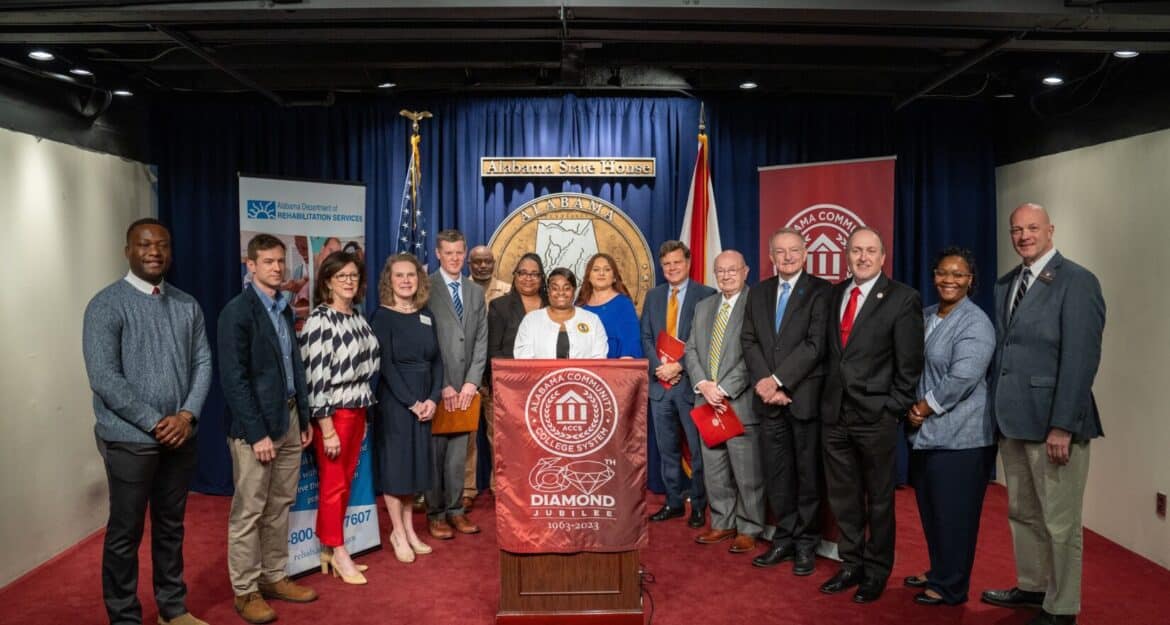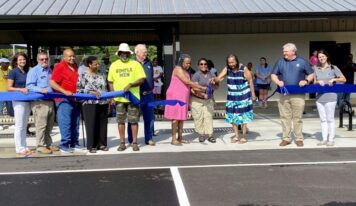Top Photo: ADRS ACCS Partnership photo
Ebony Horton Bradley, M.S.
Director of Communications & Marketing
Alabama Community College System
MONTGOMERY — The Alabama Department of Rehabilitation Services (ADRS) and the state’s public community and technical colleges are streamlining access to in-demand credentials and jobs for residents with disabilities.
“People with disabilities remain disproportionately unemployed or underemployed in comparison to the general population,” said ADRS Commissioner Jane Elizabeth Burdeshaw. “The goal of the vocational rehabilitation program is to support the business community and the individuals we serve by reducing barriers that keep otherwise qualified candidates on the sideline.”
“ADRS helps people in this special population obtain employment while also helping Alabama businesses fill needed vacancies by hiring and retaining highly skilled and highly motivated employees who come through the VRS program,” she said.
The department’s Vocational Rehabilitation Service (VRS) college training policy has eliminated most income-based eligibility requirements for individuals participating in the VRS programs and who are eligible through ADRS to access educational services at Alabama’s public community and technical colleges. Services include financial assistance with tuition, fees, books and supplies for training in associate degree programs as well as technical, certificate or short-term certificate programs.
Residents with disabilities train often at Alabama’s two-year colleges for in-demand careers such as truck driving, healthcare, and business management. In addition to training in college programs, the ACCS Innovation Center’s no-cost, rapid Skills for Success training programs are also available.
Central Alabama Community College student Brittney Fisher is among the first to train in the Alabama Community College System in a registered nursing program. She earned an apprenticeship opportunity to begin clinicals through the college’s collaboration with Coosa Valley Medical Center.
“Our ability to partner with our local community college and rehabilitation services is integral to our ability to support our community’s healthcare needs, which reaffirms our commitment to best serve the residents who need us,” said Amy Price, Chief Operating Officer and Nursing Officer of Coosa Valley Medical Center.
In addition to financial assistance for qualifying VRS participants who attend Alabama’s two-year colleges, ADRS assists colleges with much-needed accommodations to help ADRS participants successfully achieve in the classroom.
“This is why our colleges are here – to create opportunity for every Alabama resident who is able and willing to change their quality of life and be the change agents that their local businesses and communities need in order to help grow Alabama’s labor force participation,” said Jimmy H. Baker, Chancellor of the Alabama Community College System.
“We appreciate collaborating with organizations who know what it means to truly serve our communities together with the best that we can offer. We look forward to continued growth in enrollment at our colleges as a result of eliminating financial barriers for residents who might benefit from the department’s services.”
Alabama residents interested in learning more about services through the Alabama Department of Rehabilitation Services can call 1-800-441-7607 or visit www.rehab.alabama.gov. TTY users can dial 711 or visit alabamarelay.com for more information.
Residents interested in learning more about programs at Alabama’s community and technical colleges can visit www.alabama.edu or call 1-855-206-2671.
ABOUT THE ADRS
Created by the Alabama Legislature in 1994, the Alabama Department of Rehabilitation Services (ADRS) is the lead state agency serving Alabamians with disabilities, helping them to reach their maximum potential. Its continuum-of-care approach means that support and resources are available to Alabamians with disabilities at every stage of life. Find out more at rehab.alabama.gov.
ABOUT THE ACCS
Alabama’s community and technical colleges were merged into one system May 3, 1963, when legislators laid the groundwork for a unified system of institutions to focus on accessible training in “arts and sciences and in useful skills and trades” for current and future labor needs. Sixty years have passed, but that important cause remains the singular purpose of the Alabama Community College System (ACCS). With 24 community and technical colleges in more than 130 locations and an economic impact of $6.6 billion, the ACCS is Alabama’s gateway to first-class, affordable education and technical training to compete in a constantly evolving workforce. More than 155,000 Alabamians benefit from the various certification, credential, dual enrollment and degree programs the ACCS offers alongside leading industry partners. The System includes the Alabama Technology Network, which provides extensive training and service offerings directly to business and industry, and the ACCS Innovation Center, which provides rapid skills training through its Skills for Success program. The ACCS is governed by the Alabama Community College System Board of Trustees.






